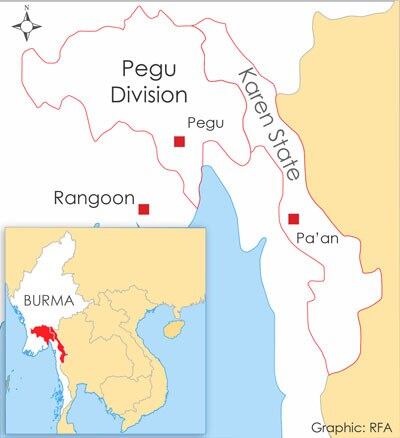Another case was made Wednesday for Burma to be hauled before a U.N. probe on war crimes and human rights abuses: its military's "abusive" treatment of convicts.
U.S.-based Human Rights Watch and a Burmese rights organization provided detailed accounts in a 70-page report on how the Burmese military forced prisoners to serve as porters under dangerous conditions at the battlefront.
The report, “Dead Men Walking: Convict Porters on the Front Lines in Eastern Burma,” was based on 58 interviews with escaped convict porters used in military operations in the eastern Karen and Pegu regions over the last two years.
Convict porters described witnessing summary executions, enduring torture and beatings, being used as “human shields” to trip landmines or shield soldiers from fire, and being denied medical attention and adequate food and shelter, the report said.
“Convict porters are the Burmese army’s disposable human pack-mules, lugging supplies through heavily mined battlefields,” said Elaine Pearson, deputy Asia director at Human Rights Watch.
“Press-ganging prisoners into deadly front-line service raises the Burmese army’s cruelty to new levels,” she said.
The military should stop forcibly recruiting prisoners as porters and mistreating them, and those responsible for ordering or participating in such treatment should be prosecuted, said Human Rights Watch, which published the report together with the Karen Human Rights Group.
“The barbaric practice of using convict porters has been a feature of armed conflict in Burma for at least 20 years, exposing them to the hazards of armed conflict with complete disregard for their safety,” said Poe Shan, director of the Karen Human Rights Group.
“The army forces other civilians to work as porters as well, but since civilians often flee conflict areas, the use of prisoners continues.”
UN inquiry

The two groups said that the Burmese government’s refusal to investigate abuses by its military should prompt concerned governments to support a United Nations-led commission of inquiry into violations of international humanitarian and human rights law in Burma.
The proposed commission has been recommended by U.N. Special Rapporteur Tomas Ojea Quintana and is supported by Burma’s democracy icon Aung San Suu Kyi.
The need for such a commission has only increased recently with the escalation of armed conflict in Burma’s ethnic areas, rights groups said.
The United States said in late June that it was prepared to support a U.N.-backed human rights probe in Burma.
Human Rights Watch and the Karen Human Rights Group said the 16 countries that have already voiced support for inquiry should include the commission's establishment in an upcoming U.N. General Assembly resolution on Burma.
“ASEAN and European Union governments should stop hoping for things to magically improve in Burma and instead strongly push for a U.N. commission of inquiry,” Pearson said. “Every day that the international community does nothing is another day that the Burmese army will press more porters into deadly service.”
Burma has been accused of having one of the world's most appalling human rights records. Some 2,100 political prisoners, many of whom have endured torture and inadequate medical care, are behind bars.
Military abuses

The Burmese military, or Tatmadaw, one of the largest armed forces in Asia with an estimated 300,000 to 400,000 personnel, has often been charged with imposing abuses on ethnic minorities, including the forced relocation of villages, forced labor, and systematic human rights abuses, including rape.
Human Rights Watch and Karen Human Rights Group said that the military's use of convict porters has been documented since as early as 1992. Burmese authorities have previously admitted the practice occurs, but claimed that prisoners are not exposed to hostilities.
The porters interviewed in the report were men ranging in age from 20 to 57, including both petty and serious offenders.
“We were carrying food up to the camp and one porter stepped on a mine and lost his leg,” one escaped porter said. “The soldiers left him, he was screaming but no one helped. When we came down the mountain he was dead. I looked up and saw bits of his clothing in the trees, and parts of his leg in a tree.”
Another escaped porter said a young boy was shot in the back by soldiers.
“The young boy told [the Burmese soldiers], ‘If I run, you will shoot me.’ They said, ‘No, we won’t kill you. You can run.’ They ordered the guy to run. Just as he walked down to the gorge, they shot him in the back. And they told us, ‘You guys see what happens? If you can’t climb up, we will kill you.’ We were afraid.”
Prison authorities selected prisoners for portering duties in groups of 30 to 150 men per facility seemingly at random from prison facilities throughout Burma, including labor camps and maximum security and local prisons, the report said.
The prisoners were transported to staging areas with between 500 and 700 prisoners, who were then assigned to individual Burmese army units. Once transferred to the front lines, they remained there indefinitely, working under inhumane and dangerous conditions without payment.
None of the prisoners interviewed had volunteered for the service, the report said.
Reported by RFA's Burmese service and Parameswaran Ponnudurai.
